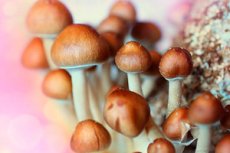
New research from UK scientists suggests that psilocybin - the active ingredient in so-called "magic mushrooms" - is an effective treatment for depression.
Published in the journal BMJ, the study found that psilocybin was a more effective treatment for depressive symptoms among study participants than a placebo, niacin (vitamin B3) or microdoses of psychedelics.
The study authors said in a statement that depression affects about 300 million people worldwide and is a leading cause of disability.
Researchers say psilocybin showed promise in reducing depressive symptoms after one or two doses, with few side effects and no current evidence that the substance is addictive.
They also said that published studies so far have not examined factors that might moderate the effects of psilocybin, including dosage, type of depression, past experience with psychedelics, and publication bias.
Details of the study of psilocybin and depression A team of British researchers searched databases for randomized controlled studies comparing psilocybin as a treatment for depression with other substances.
They also looked at studies that used psychotherapy in both experimental and control conditions to distinguish the effects of psilocybin from those produced by psychotherapy. They selected seven studies relevant to their analysis, which included 436 depressed subjects (52% women and 90% white).
The researchers measured changes in depression scores using a statistical method called Hedges' g-ratio. A Hedges g of 0.2 indicates a small effect, 0.5 a moderate effect, and 0.8 or more a large effect.
The researchers reported that after using psilocybin treatments, the change in depression scores was significantly greater than when using the proven comparison method, with an overall Hedges' g of 1.64, a measure indicating a significant effect in favor of psilocybin. p>
The scientists concluded that while their results are encouraging for psilocybin's potential as an effective antidepressant, issues such as legal safeguards as well as cost and lack of regulatory guidelines must be resolved before psilocybin can be established in clinical practice.
The researchers concluded that the study results "support a prudent approach in both scientific and public settings because more and better data are needed to make any clinical recommendations about the therapeutic use of psilocybin."
Reaction to Study on Depression and Magic Mushrooms Dr. Akanksha Sharma is a neurologist, neuro-oncologist, and palliative medicine physician at the Pacific Neuroscience Institute in Santa Monica, California.
Research published in BMJ

